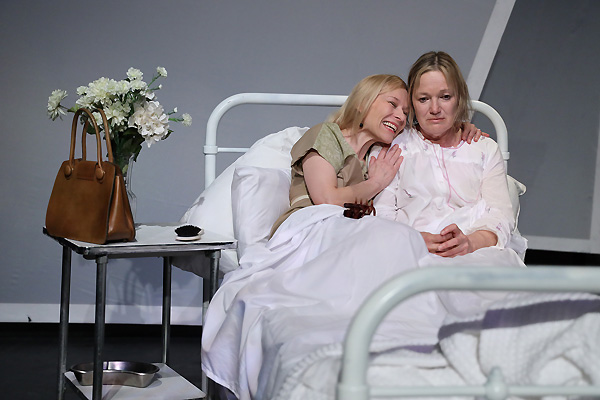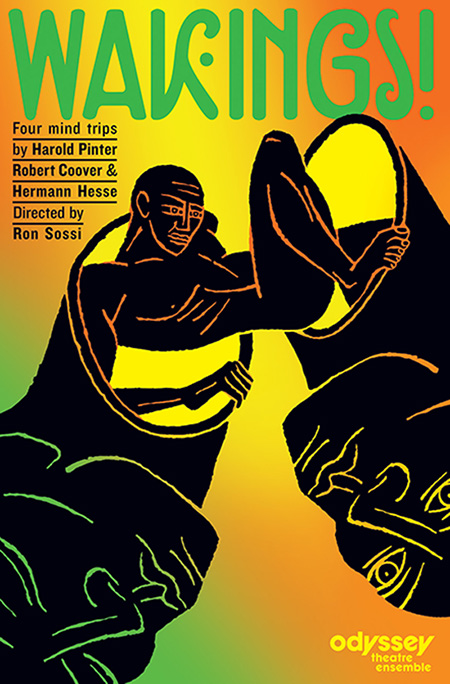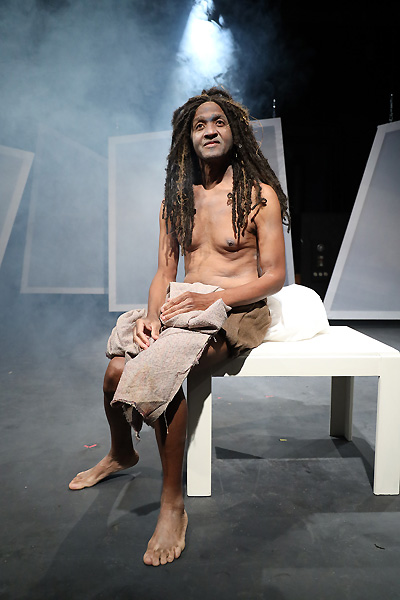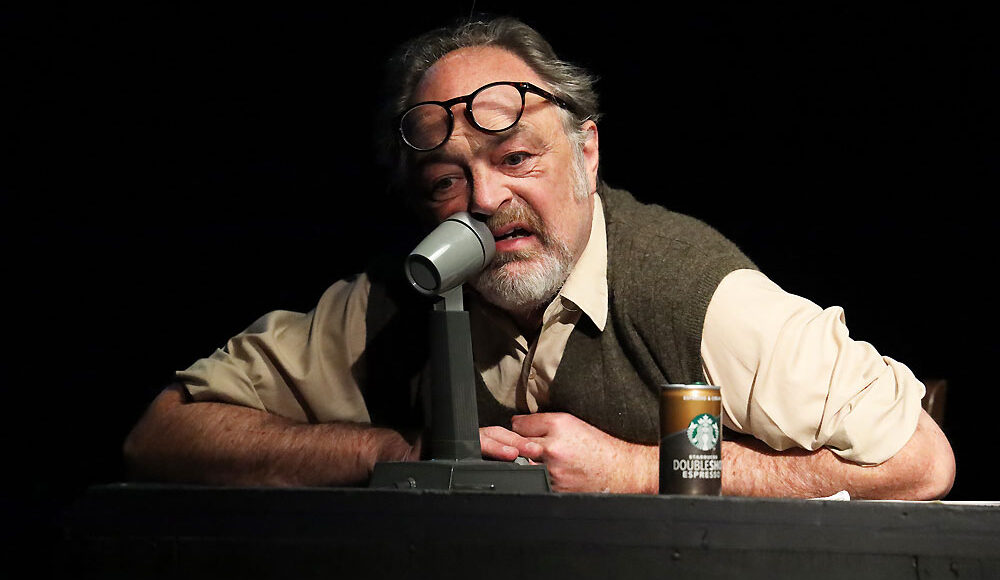By Ernest Kearney — Wakings! directed by Ron Sossi at the Odyssey Theatre Ensemble consists of four short pieces, four riddles on the nature of what it means to awake and questioning what it is that we awake to.
The first two are very specific in both time and place, the second pairing not so much. The production itself is stripped down and bare boned, focusing the emphasis on the cast, Ron Bottitta, Darrell Larson and three veterans from Sossi’s Koan Group, Diana Cignoni, Kristina Ladegaard and C.J. O’Toole, and hence exposing the audience without encumbrance to the essence of the writing and the designs of the director.

The first playlet was the viciously entertaining Victoria Station by Harold Pinter, the playwright’s own ruthlessly sharp spin on the classic Abbot and Costello routine Who’s On First?
With Bottitta as an exhausted overwrought London dispatcher trying to communicate with “Cabbie 274” (O’Toole) a spaced out Rastafarian soul who seems not to be in the same city as the dispatcher or perhaps even the same reality.
Next is Rip Awake by avant-grade American writer Robert Coover, a long agitated monologue conceived as a sequel to the Washington Irving classic short story Rip Van Winkle (1819.) In the original tale Washington has the young Van Winkle investigating the odd thunderings from a mountaintop. He, comes upon a group of outlandishly dressed bearded men playing a game of nine-pins, and after drinking from a jug of their own brewed liquor falling into a slumber. The tale ends with Van Winkle “waking” and returning to his village only to find that he has slept for 20 years, that all those he knew have aged and died and that the world which was once his has under gone the radical change of revolution and been lost to him beneath the tomb of history.

Coover picks up the tale where Irving ends it, with Van Winkle being taken in by his now grown daughter, and explores the subsequent life Van Winkle faces after emerging from his decade long dreams. He shows us Van Winkle (Larson) as a tormented soul, filled with a terror of falling once more into the prison of such a prolonged sleep, while constantly questioning the reality he has awoken to. Finally he relents of his reclaimed reality, lamenting “There’s no relief seeing things turn into themselves” and returns to the siren call of the nine-pins thundering.
The second act opens with another Pinter piece A Kind of Alaska (1982.) This short play has the distinction of being one of only two works of Pinter’s for which there is a known source.** Here it was neurologist Oliver Sack’s Awakenings, a non-fiction account of his efforts in treating patients suffering from encephalitis lethargic or “sleeping sickness.”
Bottitta plays the doctor’s role based on Sacks who is on hand to watch his patient Deborah (Diana Cignoni) as she emerges from a 29-year-long coma. Later Deborah’s sister Pauline (Kristina Ladegaard) arrives and she and the doctor attempt to convey to Deborah the reality to which she’s awakened, as she clings onto the reality that has been lost to her illness. “Nothing has happened to me,” she insists, “I’ve been nowhere.”
The final riddle in this quartet is the awakening of Buddha (O’Toole) as taken from the pages of Herman Hesse’s Siddhartha.
What one must acknowledge about this evening are the exquisite performances of all the actors, however, in that regard the first act does over power the second with Bottitta and O’Toole near perfect in their clashing interplay and Lawson a maelstrom onto himself as Van Winkle.
But if the power of the performances hold sway in the first act, it is the pondering that reigns in the second as the tempo downshifts to a pace that welcomes contemplation.
Throughout the evening Sossi does what Sossi does so superbly; pushing and prodding his audience with evincements and implications. Now it is expected of a good director to provide a clarity to the material he’s working with and Sossi does, but his is a clarity not of limpidity but kaleidoscopic in nature, whose desired effect is seemingly not to communicate concepts to an audience but rather to challenge them to devise their own.
Sossi generally seems less concerned with entertaining his theatai than enticing, one is tempted to say “waking” them, to contemplation. Thus Sossi is choosing for himself not the role of Odysseus but that of the sirens.

What I often find in Sossi’s direction, and this I feel is true in Wakings!, is not his imposition of an arbitrary clarity but a presentation of his reasoned recognition of what is vital and what may not be.
In Wakings! this seems to express the impossibility of Bottitta’s increasingly exasperated dispatcher, Larson’s increasingly more isolated Van Winkle and Cignoni’s increasingly more resistant patient of ever actually engaging or participating in their worlds.
They all wish to control their worlds, when in fact all they are capable of controlling is the extent of their self delusion in denying their own powerlessness.
Only O’Toole’s Buddha escapes this crippling illusion by not assuming he has any mastery of the world around him, and acknowledging nothing in the universe is within his control, save his choice to be at peace with that truth.
This acceptance brings enlightenment, and at the end of Wakings! Buddha smiled.
And no doubt so does Ron Sossi.
** The other Pinter piece is One For the Road which, according to Antonia Fraser, he wrote after reading Jacobo Timerman’s Prisoner Without a Name, Cell Without a Number.
***
(Note: Featured Image – Ron Bottitta in “Victoria Station” / Photo by Josh La Cour)
# # #
Wakings!
at
Odyssey Theatre
2055 S. Sepulveda Blvd.
Los Angeles CA 90025
Performances: Thru June 5
• Fridays at 8 p.m.: June 3
• Saturdays at 8 p.m.: June 4
• Sundays at 2 p.m.: June 5
For Tickets and Additional Information:
(310) 477-2055 ext. 2 or www.OdysseyTheatre.com






Brian knudson | June 7, 2022
|
Great review, Ernest!
it was A wonderful and thought-provoking night of theatre, with topnotch actors!
Diana Cignoni | June 6, 2022
|
Thank you for the correction! the Roles are now Accurate.
Sage James | June 4, 2022
|
IT IS REALLY SAD THAT PEOPLE LIKE YOU GET AWAY WITH SUCH BUTCHERING OF NAMES. Cignoni played
Pauline. You need to wake up yourself. Fix your mistake, and pay attention to the names.
Bottitta plays the doctor’s role based on Sacks who is on hand to watch his patient Pauline (Ladegaard) as she emerges from a 29 year long coma. Later Pauline’s sister Deborah (Cignoni) arrives and she and the doctor attempt to convey to Pauline the reality she’s awoke to, as she clings onto the reality that has been lost to her illness. “Nothing has happened to me,” she insists, “I’ve been nowhere.”
Sage James | June 4, 2022
|
Correction: Cignoni played Deborah, but deborah is the one who emerges from a 29 year long coma. That is what i meant to say. You mixed up the charters in your review.
Diana Cignoni | June 1, 2022
|
THIS IS WRONG. THE REVIEW is not CORRECT. DIANA CIGNONI plays DEBORAH, the patient in HAROLD PINTER’S A KIND oF ALASKA. PLEASE CORRECT ASAP!
Sage james | June 4, 2022
|
I really enjoyed this play. Your charter was deborah who emerged from the coma. The review really confused me.